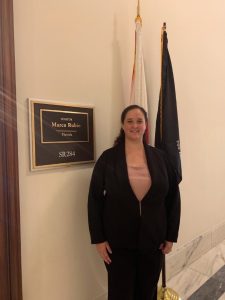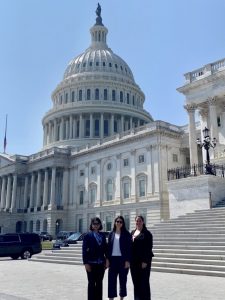September 26, 2019
Realizing Your Knowledge is Powerful: A Recap of Geosciences Congressional Visit Day 2019
Posted by Caitlin Bergstrom
Molly Anderson earned a BA in English Writing, a BS in Geosciences, and an MS in Geoscience at Boise State University before pursuing a PhD in Geology as a Graduate Research Fellow at the University of Florida. She is studying the chemistry of lavas from sub marine volcanoes in the Pacific Ocean to better understand Earth’s mantle. Molly participated in AGU’s 2019 Congressional Visits Day.
Having grown up in a small farm town in Idaho far from Washington, DC, I never imagined I would have the opportunity to speak with legislators on Capitol Hill about science. My perception of the science policy world was that some omniscient senior scientist with decades of experience explained important geoscience research to legislators, and the process for informing policy was out of my reach. This September I was provided with the opportunity to learn more about science informing policy through AGU’s Congressional Visits Day (GEO-CVD), and I am pleased to find my perceptions were wrong.
Each year around September, members of AGU and other scientific societies convene on Capitol Hill for Congressional Visits Day to discuss the importance of Earth and Space science with legislators. September is a critical month for advocating for science because budget negotiations are ongoing and therefore on the legislators’ minds and agendas. GEO-CVD program prepares geoscientists from all levels of expertise to bring a personalized message to legislators in an approachable manner that can then be acted upon by legislators. We attended a workshop where we learned more about how Congress manages and debates the annual budget, and then we practiced framing our scientific message to a legislative audience.

Molly standing outside Senator Marco Rubio’s office.
I visited several congressional offices for Florida and Texas with another PhD student and a successful Texas business owner, and I found that our stories were received with excitement. Our representatives heard from us about how funding institutions like the National Science Foundation maintain a strong geoscience workforce, enables entrepreneurs to grow strong local businesses, and develops more resilient infrastructure against natural hazards. We found our common interests with the legislators, offered to remain a resource for geoscience related issues, and we were warmly invited to return. This experience on the Hill demonstrated how enthusiastic representatives’ offices are to receive constituents and listen to our stories.
Geoscientists possess the knowledge and experience to help our society thrive when our results are communicated in a meaningful way. I have found it easy to get absorbed in the research questions, data, and many, many rocks… but at the end of the day, science is powerless without communication and action. It is our right as constituents to have our voices heard. It is also our responsibility to share our findings, and to communicate the meaningful results of our hard work. The more voices we take to Capitol Hill, the more we inform science policy. The most important thing to remember is that there isn’t an omniscient scientist advocating for science on Capitol Hill, but rather it is each voice speaking with the legislators about our own expertise who can make the difference.


